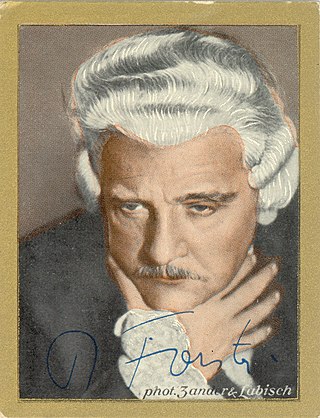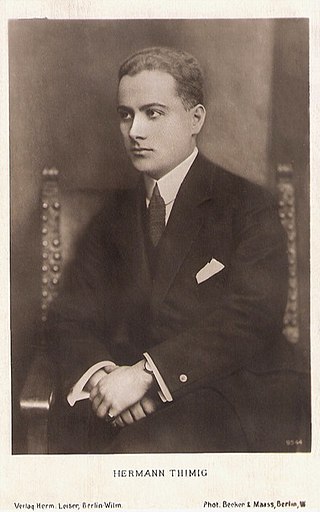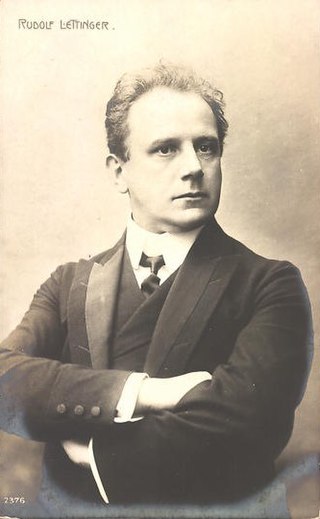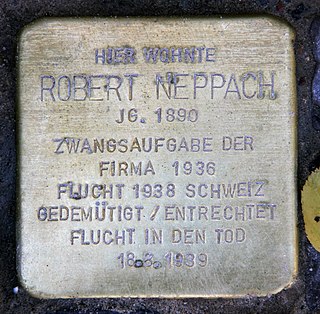Max Pohl | |
|---|---|
 Pohl c. 1922 | |
| Born | 10 December 1855 |
| Died | 7 April 1935 (aged 79) |
| Occupation | Actor |
| Years active | 1876–1931 |
Max Pohl (10 December 1855 – 7 April 1935) was an Austrian stage and film actor. [1]
Max Pohl | |
|---|---|
 Pohl c. 1922 | |
| Born | 10 December 1855 |
| Died | 7 April 1935 (aged 79) |
| Occupation | Actor |
| Years active | 1876–1931 |
Max Pohl (10 December 1855 – 7 April 1935) was an Austrian stage and film actor. [1]

Frederick Schiller Faust was an American writer known primarily for his Western stories using the pseudonym Max Brand. As Max Brand, he also created the popular fictional character of young medical intern Dr. James Kildare for a series of pulp fiction stories. His Kildare character was subsequently featured over several decades in other media, including a series of American theatrical movies by Paramount Pictures and Metro-Goldwyn-Mayer (MGM), a radio series, two television series, and comics. Faust's other pseudonyms include George Owen Baxter, Evan Evans, Peter Dawson, David Manning, John Frederick, Peter Henry Morland, George Challis, and Frederick Frost. He also wrote under his real name. As George Challis, Faust wrote the "Tizzo the Firebrand" series for Argosy magazine. The Tizzo saga was a series of historical swashbuckler stories, featuring the titular warrior, set in Renaissance Italy.

Fritz Kortner was an Austrian stage and film actor and theatre director.

My Belief: Essays on Life and Art is a collection of essays by Hermann Hesse. The essays, written between 1904 and 1961, were originally published in German, either individually or in various collections between 1951 and 1973. This collection in English was first published in 1974, edited by Theodore Ziolkowski.
Mutz Greenbaum, sometimes credited as Max Greene or Max Greenbaum, was a German film cinematographer.

Werner Johannes Krauss was a German stage and film actor. Krauss dominated the German stage of the early 20th century. However, his participation in the antisemitic propaganda film Jud Süß and his collaboration with the Nazis made him a controversial figure.

Bernhard Goetzke was a German stage and film actor. He appeared in 130 films between 1917 and 1961.

Rudolf Forster was an Austrian film actor. He appeared in more than 100 films between 1914 and 1968. His autobiography Das Spiel, mein Leben was published by Propyläen Verlag in 1967. He was born in Gröbming, Austria, and died in Bad Aussee, Austria.

Hermann Thimig was an Austrian stage and film actor. He appeared in 102 films between 1916 and 1967.

Dimitri Buchowetzki (1885–1932), born Dmitry Savelyevych Bukhovecky, was a Russian film director, screenwriter, and actor in Germany, Sweden, United States, United Kingdom, and France.

Max Neufeld was an Austrian film director, actor and screenwriter. He directed 70 films between 1919 and 1957. He directed the 1934 film The Song of the Sun, which starred Vittorio De Sica.

Paul Graetz was a German actor and star of the Weimar cabaret.

Paul Biensfeldt was a German-Jewish stage and film actor.

Hermann Vallentin was a German actor.
Carl Hoffmann was a German cinematographer and film director.

Wilhelm Diegelmann was a German actor.

Rudolf Lettinger was a German stage and film actor. He made his stage debut in 1883 when he played the role of Kosinsky in Friedrich Schiller's drama The Robbers. Some of his more prominent roles in his prestigious stage career were Cyrano de Bergerac and Gessler in William Tell. He also worked with acclaimed stage director Max Reinhardt. In 1912, Lettinger played his first film role in Das Geheimnis von Monte Carlo. Lettinger appeared in over 90 films until 1931, mostly as a supporting actor. His best-known film is perhaps The Cabinet of Dr. Caligari (1920), where Lettinger portrayed Dr. Olsen.

Josefine Dora was an Austrian stage and film actress. She appeared in over 100 films, generally in supporting roles such as in The Virtuous Sinner (1931).

Robert Neppach was an Austrian architect, film producer and art director. Neppach worked from 1919 in the German film industry. He oversaw the art direction of over 80 films during his career, including F.W. Murnau's Desire (1921) and Richard Oswald's Lucrezia Borgia (1922). Neppach was comparatively unusual among set designers during the era in having university training.
Maxim Galitzenstein was an Austrian film producer active in the German film industry during the silent era. Of Jewish background, Galitzenstein was associated with the film pioneer Oskar Messter before the First World War.